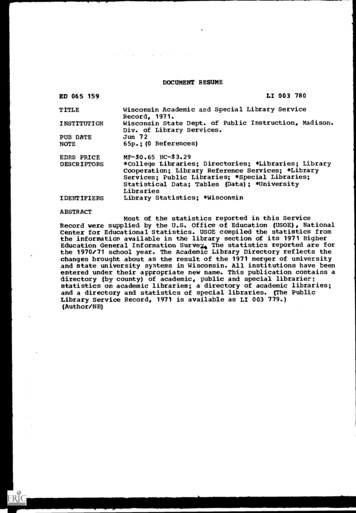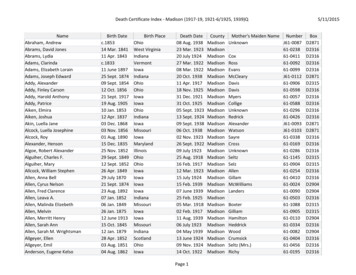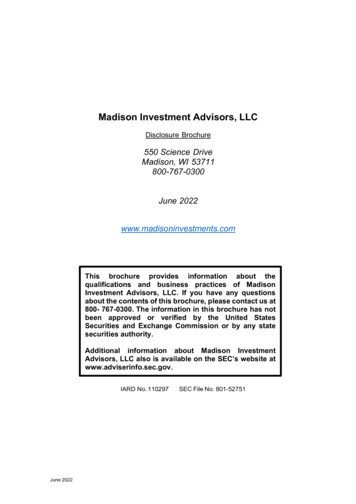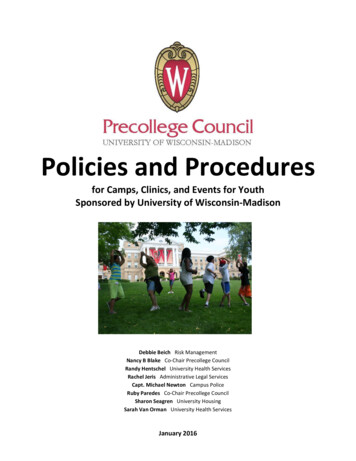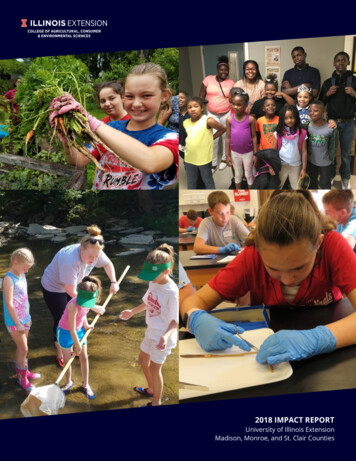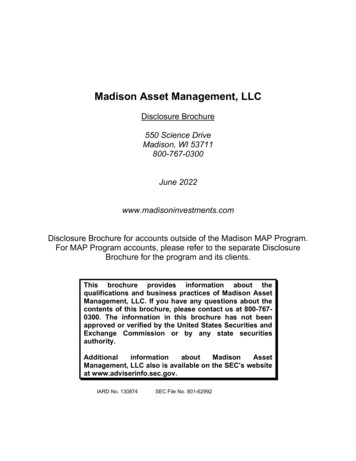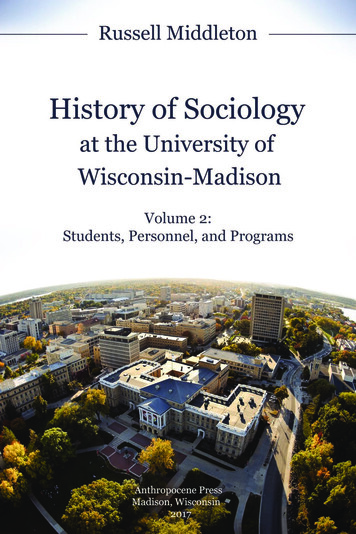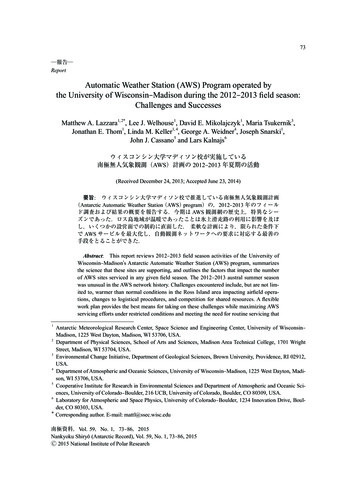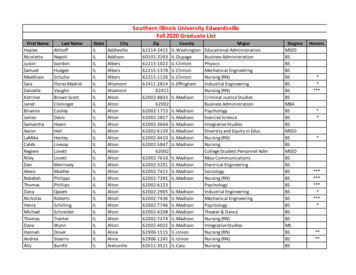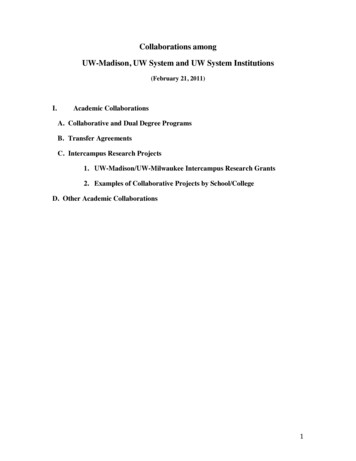
Transcription
Collaborations amongUW-Madison, UW System and UW System Institutions(February 21, 2011)I.Academic CollaborationsA. Collaborative and Dual Degree ProgramsB. Transfer AgreementsC. Intercampus Research Projects1. UW-Madison/UW-Milwaukee Intercampus Research Grants2. Examples of Collaborative Projects by School/CollegeD. Other Academic Collaborations1
A. Collaborative and Dual Degree ProgramsCollaborative Degree ProgramPartner InstitutionsDual Degree - BS in Physics, BS in EngineeringEAU, LAC, OSH, RVF, WTWBS in Nursing (Collaborative Program)EAU, GBY, MIL, OSHDual Degree - BS in Chemistry, Comp Sci, or Math,BS in EngineeringLACMS in Educational Leadership & Policy AnalysisOS, WTWDoctor of AudiologySTPPhD Art History/PhD Architecture PartnershipMILMaster of Social Work Part-time ProgramEAUAbout the Doctor of Audiology - important collaborative program with UWStevens Point. this is one of very few programs in Wisconsin thateducates professional AudiologistsPhD Art History/PhD Architecture - a model for how two researchdoctorates might collaborate. The two programs together have establisheda national reputation in vernacular architecture that exceeds whateither program was able to do alone.Master of Social Work Part time program at UW Eau Claire - veryimportant partnership with UW EC to offer social work. Essential for SWeducation in the Chippewa Valley and the NW part of the state. Wecouldn't do this without UWEC's partnership.BS Nursing at Gundersen Lutheran Clinic, not listed above butpartnership with UW LaCrosse is vital to the success of that program.BS Nursing Collaborative Program - also a very important partnershipwith four other UWs.2
B. Transfer Agreements1. UW-Madison Connections ProgramPartner CampusesAll of the University of Wisconsin Colleges two-year campuses participate in the UW–Madison Connections Program, as do many of the UW four-year campuses and severaltechnical and tribal colleges.Our Connections partner campuses are:Two-Year Campuses UW–Baraboo/Sauk Co.UW–Barron CountyUW–Fond du LacUW–Fox ValleyUW–ManitowocUW–Marathon Co.UW–MarinetteUW–Marshfield/Wood Co.UW–RichlandFour-Year Campuses University of Wisconsin–GreenBay University of Wisconsin–Parkside University of Wisconsin–RiverFalls UW–Rock CountyUW–SheboyganUW–Washington Co.UW–WaukeshaMadison Area Technical CollegeMilwaukee Area TechnicalCollegeNicolet Area Technical CollegeCollege of Menominee NationUniversity of Wisconsin–StevensPointUniversity of Wisconsin–Stout2. Guaranteed Transfer ProgramThe University of Wisconsin–Madison participates in the University of Wisconsin CollegesGuaranteed Transfer Program. To participate in the program, students must begin as freshmen at theUW Colleges and submit a Declaration of Intent to Participate to UW–Madison’s Office ofAdmissions prior to completing 30 credits at a UW Colleges campus.UW CollegesOur 13 UW Colleges, located throughout Wisconsin, offer general education and foundationcourses for more than 200 majors. Campuses are located in Baraboo/Sauk County, Barron County,Fond du Lac, Fox Valley, Manitowoc, Marathon County, Marinette, Marshfield/Wood County,Richland, Rock County, Sheboygan, Washington County, and Waukesha.3
3. Transfer ContractsA transfer admission program for students who begin in an associate degree program at one of theparticipating two-year colleges, namely: College of Menominee Nation, Madison Area TechnicalCollege, Milwaukee Area Technical College, or Nicolet Area Technical College. The followingPDFs will provide more information: Transfer Contract (PDF, 258K) College of Menominee Nationo Checklist and Worksheet (PDF, 81K)o Curricular Requirements (PDF, 52K)o Online Resources (PDF, 63K) MATC Madison, MATC Milwaukee, and Nicolet Collegeo Checklist and Worksheet (PDF, 96K)o Curricular Requirements (PDF, 55K)o Online Resources (PDF, 63K)4
C. Intercampus Research Projects1. UW-Madison/UW-Milwaukee Intercampus Research Grants2010-11 and 2011-12Eight hybrid teams of faculty from the University of Wisconsin-Milwaukee (UWM) and the University of WisconsinMadison have been awarded the first batch of Intercampus Research Incentive grants, awards designed to foster interinstitutional collaboration.The awards, announced today by UW-Milwaukee and UW-Madison, total 398,000 and will support a suite of projectsranging from the development of new materials to combat air pollution to the use of algae to clean wastewater andgenerate energy. Each award is in the range of 50,000 for one year.The Intercampus Research Incentive Grants Program, announced in January by UW-Madison Chancellor Biddy Martinand UW-Milwaukee Chancellor Carlos E. Santiago, is an initiative to foster research projects and scholarshipundertaken jointly by researchers at the two institutions.The program is funded by UW-Madison and UW-Milwaukee donors. Projects were selected by a committee of facultyand administrators from both institutions.Projects funded by the new initiative in 2009-10 include: roduction.LindaGraham,UW- ‐Madison,andEricaYoung,UW- oparticlesforcell- ,UW- ‐Milwaukee,andRalphAlbrechtandPaulVoyles,UW- s.RobStriker,UW- ‐MadisonandAndrewUlijasz,UW- anufacturing.XiaochunLi,UW- ‐MadisonandChrisYuan,UW- ‐Milwaukee.Laser- ien- ‐ChienJen,UW- ‐MilwaukeeandFrankPfefferkorn,UW- alstocombatairpollution.MarcAnderson,UW- ‐MadisonandAlGhorbanpoorandKonstantinSobolev,UW- di- ‐PorterandNaderSheibani,UW- ‐MadisonandHaoZhang,UW- rtin,MichaelKoenigsandJosephNewman,UW- UW- ‐Milwaukee.5
1. Examples of Collaborative Projects by School/CollegeThis is not an exhaustive list of collaboration, but is intended to provide examples of the rangeof collaborations that UW-Madison faculty and staff have with other System institutions thatwe intend to continue.CALS h:TheCALS- reandNaturalResources(CERANR)provides ocatedatUW- ‐Madison,- ‐Platteville,- ‐RiverFalls,and- Shutskealsomanagesthe 6.5millioninter- ‐institutionalagreementbetweenUW- tfund11integratedfacultyspecialistsatUW- ‐PlattevilleandUW- ResourcesCenter(ERC)collaborateswithUW- ‐Extensiononarangeofenvironmentally- t–CollegeofNaturalResources;UW- ‐GreenBay,CofrinCenterforBiologicalDiversity;UW- vironmentalCenter;UWStout;andtheUW- ‐SuperiorMacroInvertebrateLab.Troy Runge, Director of the WI Bioenergy Initiative and Assistant Professor inBiological Systems Engineering: Within his work as a faculty member and WBI Director,Dr. Runge supervises a graduate student who works on the UW Stevens Point campus but iscompleting her program in CALS/BSE. Runge also works on the creation of a curriculumfor a bioenergy minor/certificate between UWSP and UW Madison.Susan Nitzke, Department Chair of Nutritional Sciences: UW-Madison's NutritionalSciences Department is the home base for a USDA Higher Education Challenge Grant thatallows CALS to work with five partner institutions to expand opportunities forundergraduate dietetics students to gain experience with public health and community6
nutrition. These participating colleges and universities are UW-Madison, UW-StevensPoint, UW-Stout, UW-Green Bay, Viterbo University and Mount Mary College. Mark Rickenbach, Associate Professor of Forest and Wildlife Ecology: Works onapplied research with Melinda Vokoun of UW-Stevens Point - College of Natural Resourceson a project to investigate Wisconsin's logging sector capacity related to traditional woodproducts and bioenergy. The project is funded through the Wisconsin Bioenergy Initiative. Michelle Miller, Associate Director of Center for Integrated Agricultural Systems(CIAS): Cooperates through CIAS with UW-River Falls on projects focused onecologically-friendly fruit production; with UW-Green Bay on a joint Xerces/CIAS nativepollinator project; and with UW-Eau Claire, UW-Oshkosh, UW-Fox Valley, UW-MarathonCounty, UW-Stevens Point, UW-Barron County, UW-River Falls, UW-Whitewaterregarding campus food sustainability feEcology:CollaboratesextensivelywithUW- deDr.RobertGovettofUW- ‐StevensPointandJohnDuPlissis,UW- lSciencesDepartment,theDirectoroftheUW- 50/50splitappointmentwithUW- ‐StevensPoint,servingasco- urswithUW- ollaborateswithUW- entalsocooperatesonhealth- ‐orientedresearchwithUW- velopamulti- ‐institutionalpartnershipbetweenUW- ‐MadisonandUW- ‐Colleges.ThemainUW- edatUW- ‐Marathoncountyandsimultaneous,interactivepoint- ‐to- ‐pointvideoatUW- ‐FoxValley. Business Wisconsin School of Business collaboration with UW-Milwaukee on Chancellor’s Degreefor Executive MBA for Kohls. The Center on Business and Poverty supports and disseminates high-quality research intoways in which businesses can help globally improve the long-term economic stability andwell-being of their low-income employees. The center helped start the Urban7
Entrepreneur Partnership in Milwaukee. Collaborators include Aurora, UW Hospital andClinics, Food Fight, TDS, Office of the Mayor of Milwaukee, UW-Milwaukee.ContinuingStudies TheWisconsinHighSchoolTheatreFestival,athree- W- Forensic One- udeUW- ‐Whitewater,UW- ‐StevensPoint,UW- ‐LaCrosse,ViterboUniversity,andUW- ‐Oshkosh. UW-Extension assigns Fund 104 and some other resources (generally federal and state agencyfunds)—including General Purpose Revenue, Spending Authority, and FTE—to UW-Madison toensure access to specialized research knowledge and expertise, and to support noncreditprofessional development and personal enrichment programming and credit programming designedto meet the needs of nontraditional learners. These resources are transferred as a result of ongoingnegotiations between the UW-Extension divisions and various UW-Madison academic units. TheDivision of Continuing Studies manages the flow of information, resources, and programmingcommitments in support of the extension function. In Fiscal Year 2010-11, DCS is responsible for managing approximately 19.0 million in GeneralPurpose Revenue (Fund 104), 32.8 million in Program Revenue, and 1.7 million in other funds (amix of federal and state agency funds). Over 360.0 FTE are budgeted using UW-Extension funding. Also attached, is information about the IIA additional funds (funds that flow thru UW Extension otherthan fund 104). The experts on the Madison campus for these funds are the school/collegesindicated under the column headed "Madison-School/College". We receive base amounts on theannual IIA for these funds. During the year we receive various addenda and corresponding budgettransfers for these funds. In some cases, mostly for the federal funds, these addenda and transferscan represent significant amounts. Sometimes funding for various positions or the FTE's are notincluded in our base IIA budget, but there can be both long standing and newly negotiatedagreements that the funding and FTE will be provided as an addendum during the fiscal year. Inaddition, the federal funds require state match. It would be important to include CALS, SoHE, andSchool of Business in the conversation before making decisions on budget items for these fundsbecause of their unique expertise and knowledge of these funds. Consideration also needs to be given to the fact that UW-Extension staff provide much of theexpertise and time and effort for the federal grants involved, including grant applications, federalreporting, and perhaps additional state match. UW-Madison does not currently have the expertise orstaffing for this function. Finally, I should mention that we rely heavily on the UW-Extension registration office and the PyleCenter for much of our outreach programming. While this is not a contractual arrangement it wouldhave a profound impact on us if our relationship with UW-Extension became less collegial.8
)withUW- S)withUW- ‐Milwaukee.*WisconsinEnergyInstitute(WEI)withUW- - residentatUW- ‐Stout.HumanEcology alls,andUWMilwaukee.International mentisco- tiveLanguageProgram(CLP)providescriticallanguage9
pporttheseofferings.Itisagrant- heirstudentstousea.9meterWIYN- ‐managedtelescope(UW- rogramareaofCooperativeExtensionwithinUW- - ationatUW- .Libraries* The UW Digital Collections Center (UWDCC) collaborates with UW System faculty, staff andlibrarians to create a provide access to digital resources that support the teaching and research needsof the community, uniquely document the university and state of Wisconsin, and provide access torare or fragile items of research value. In recent years, the UWDCC has partnered with UWMadison departments, may UW System campuses, Wisconsin public libraries, the WisconsinHistorical Society, the Wisconsin Humanities Council and other entities to create digital resourcesthat facilitate research and instruction for a variety of web-based learners.SMPH10
vingUW- Wisconsin,andUW- ‐Milwaukee.*TheSMPHalsohasapartnershipamongUW- ialandin- lstudentpipelineprogramwesetupwithUW- ‐MilwaukeeandUW- er- tribal- cludeUW- ‐MilwaukeeandUW- ‐StevensPoint.Nelson Institute for Environmental pusesandentities,includingUW- ‐Madison,UW- ‐Milwaukee,UW- ‐GreenBay,UW- ‐StevensPoint,UW- ‐LaCrosse,UW- sionalassociations,non- ers.NursingSince its founding in 1924 as the first university nursing program in Wisconsin, the UW MadisonSchool of Nursing’s work has reached across the state. The school was instrumental in the creationof a nursing program at UW Milwaukee in 1965, and nursing graduates from UW Madison are infaculty and leadership positions in the other UWS nursing programs at Eau Claire, Green Bay,11
Oshkosh and Milwaukee as well as in most of the Wisconsin Technical College nursing programacross the state.Today, UW Madison School of Nursing leads several collaborative initiatives involving UWSystem and Wisconsin Technical College nursing programs designed to improve the quality ofnursing education in Wisconsin. The UW Madison School of Nursing led the development of the successful statewideBSN@Home program, a collaborative venture among the five UWS nursing programs (EauClaire, Green Bay, Madison, Milwaukee and Oshkosh) which provides access to online BScourses for graduates of associate degree nursing programs. This program, begun in1994, was the first system-to-system articulation agreement between UW System andWisconsin Technical College System for transfer of academic credits toward a BS degree.In 2004, in cooperation with UW Eau Claire, the UW Madison School of Nursing alsoestablished its Western Campus BS program option in partnership with Gundersen LutheranHealth System in La Crosse, thereby creating access to public BS nursing education in thatregion of the state. UW Madison nursing faculty are leading Project LEAP, a Federally-funded project linkingUWS and WTCS nursing programs with public health departments across the state toimprove the quality of public health nursing education and practice, especially in ruralparts of the state. This project has supported partnerships between nursing faculty andpublic health nursing units to expand placements for basic nursing students, facilitatedcooperative engagement on public health activities and created a dynamic network of publichealth nurses and nurse faculty across the state working to address serious workforce issues.This project has been acclaimed as one of the most innovative initiatives in public healthnursing education in the nation, and has just received a second 5-year funding award fromDHHS, based on the success of the first five years of the project. UW Madison nursing faculty lead Project TECHNE, a Federally funded project involvingUWS and WCTS nursing faculty focusing on integrating effective new instructionaltechnologies to improve quality of nursing education. This project allowed nursing facultyacross the state to learn to use new technologies, such as high-fidelity clinical simulation,collaboration software, and virtual environments to improve teaching and extend access tonursing education across the state. As a result, faculty have collaborated on the creation ofvirtual clinical simulation scenarios as well as a teaching/learning site for nursing studentsin the virtual world of SecondLife, and held four statewide conferences on emerging trendsin instructional technologies. Nursing programs within the UW System actively collaborate to ensure the availability ofneeded programs regionally and statewide, and facilitating access to specialty programs fornursing students across the system while avoiding specialty program duplication. As a resultof this planning, UW Madison School of Nursing maintains the only specialty nursingeducation programs in pediatric and school health nursing, as well as the only graduateand postgraduate psychiatric-mental health nursing certification programs in Wisconsin.These programs are of critical importance to Wisconsin, especially to inner city and ruralcommunities as they produce new advanced nurses available for practice and allow existingnurse practitioners and nursing faculty to retool for these fields.12
Pharmacy* We visit all the 4-year UW campuses and many of the 2-years to recruit students into thepharmacy program. That involves a long-term relationship with one or more faculty/staff atthe campuses and annual site visits to almost all.Vet es(CERANR),whichinvolvestheSVM;CALS;UW- ceandAgriculture;UW- entalSciences;andUW- tativesofUW- ‐Extension.D. - rtheyearstheUW- Theyinclude: n,isfundedcooperativelythroughUWSystem.UW- age.) publisher,Lexis- llother13
campusesexceptUW- ‐Milwaukee- ‐- "- ‐- icense. thepresent. TheBrillE- tandIslamicStudies,ClassicalStudies,etc.)for2007- utUW- dbuycooperativelythroughtheCIC.14
The University of Wisconsin-Madison participates in the University of Wisconsin Colleges Guaranteed Transfer Program. To participate in the program, students must begin as freshmen at the UW Colleges and submit a Declaration of Intent to Participate to UW-Madison's Office of Admissions prior to completing 30 credits at a UW Colleges campus.
